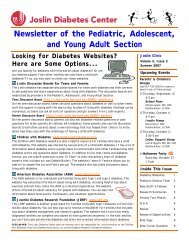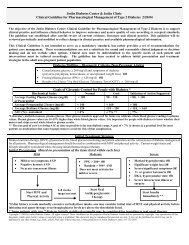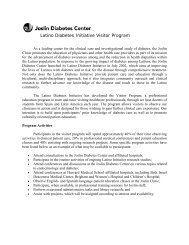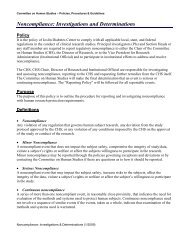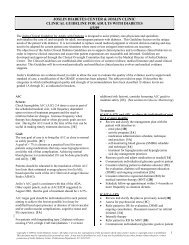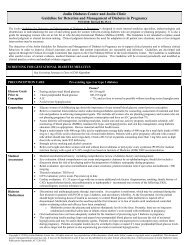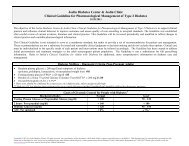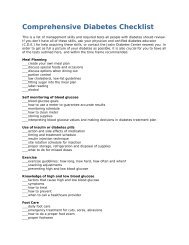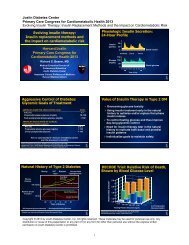You also want an ePaper? Increase the reach of your titles
YUMPU automatically turns print PDFs into web optimized ePapers that Google loves.
PAGE 4 NEWSLETTER OF THE PEDIATRIC, ADOLESCENT, & YOUNG ADULT SECTION<br />
Did You Know that March is National Child Life Month?<br />
What’s a Child Life Specialist?<br />
Child Life Specialists are<br />
professionals with training in child<br />
development who work with<br />
children, adolescents, and their<br />
families in health care settings like<br />
<strong>Joslin</strong>. Child Life Specialists work<br />
with children and families to help<br />
reduce stress and anxiety during<br />
clinic visits or hospital stays.<br />
Child Life services typically include activities designed to:<br />
��Help children express their feelings and emotions<br />
��Help reduce children’s anxiety through developmentally appropriate<br />
play<br />
��Prepare and support children during medical procedures<br />
��Provide health-specific education and information<br />
��Support all members of a child’s family—siblings, parents, etc.<br />
<strong>Joslin</strong> has two Child Life Specialists – Jenn Douglass and Courtney<br />
Seiter. You can usually find Jenn and Courtney working with patients<br />
and families in the playroom, but there are many other ways that they<br />
help families at <strong>Joslin</strong> (see “Here’s How We Can Help” at right).<br />
Courtney and Jenn in the playroom<br />
Jenn and Courtney would love to speak to you more about what they<br />
do or how they could help your family. If you have any questions or<br />
concerns, please let your provider know at your next visit or look for<br />
Jenn or Courtney in the playroom. You can also contact them at:<br />
Jenn Douglass<br />
Jennifer.Douglass@joslin.harvard.edu<br />
617-732-2699 ext. 4529<br />
Recipe: Peter Cottontails<br />
(from Healthy Snacks for Kids by Penny Warner)<br />
Everyone can help<br />
make these easy<br />
treats! You can eat<br />
them plain or pair<br />
them with crackers<br />
or other veggies.<br />
<strong>Joslin</strong>’s Child Life Specialists also<br />
plan several events throughout the<br />
year for our pediatric families.<br />
These events are an opportunity for<br />
families to come together and<br />
connect with one another. Here are<br />
the upcoming events in <strong>2009</strong>:<br />
��Teddy Bear Clinic — March 14<br />
��Teen Fenway Park Tour — May 20<br />
��Summer Magic Night — July 15<br />
��Halloween Party — October 24<br />
Courtney Seiter<br />
Courtney.Seiter@joslin.harvard.edu<br />
617-732-2699 ext. 4528<br />
Ingredients:<br />
�� 1 package (3 oz.) light cream cheese<br />
�� ½ cup shredded cheddar cheese<br />
�� 1 cup finely shredded carrots<br />
�� ½ cup crushed fiber cereal<br />
Here’s How We Can Help<br />
��Provide activities that focus on children’s<br />
feelings about diabetes or other health care<br />
experiences. We may have a child write a<br />
letter to “diabetes” or to his or her doctor.<br />
��Help children feel more comfortable during<br />
visits by engaging them in meaningful play.<br />
��Provide age-appropriate diabetes education<br />
and address misconceptions about diabetes<br />
or other health care experiences. We may play<br />
<strong>Diabetes</strong> Land, a board game that focuses on<br />
recognizing symptoms of high and low blood<br />
sugars.<br />
��Safely use diabetes supplies in play activities<br />
to encourage exploration and increase<br />
familiarity with diabetes management tools.<br />
Children may use needle-less supplies to do<br />
art projects or perform diabetes care on a<br />
doll.<br />
��Teach techniques to help children cope with<br />
injections, fingersticks, blood draws, and<br />
other parts of diabetes management. We can<br />
educate families on stress management<br />
techniques using distraction and deep<br />
breathing.<br />
��Prepare children for medical procedures, like<br />
a blood draw or new treatment. We may show<br />
a child the supplies used during a lab visit and<br />
discuss what happens during the procedure.<br />
��Help educate siblings about diabetes.<br />
��Suggest practical ways to help families<br />
manage their diabetes treatment plans. If a<br />
child is having a hard time rotating injection<br />
sites, we can help develop a site rotation plan.<br />
��Help children find simple ways to explain<br />
diabetes to their friends.<br />
��Provide support to parents/caregivers when<br />
challenges with diabetes management arise.<br />
Directions:<br />
�� Beat the cheeses together until<br />
blended.<br />
�� Stir in carrots.<br />
�� Cover and chill for 1-2 hours.<br />
�� Shape into balls, roll in the cereal<br />
and then chill until ready to serve.<br />
�� Makes 16 balls.<br />
Nutrition Facts:<br />
serving size: 1 ball<br />
Calories: 40<br />
Protein: 2 g<br />
Carbohydrate: 4 g<br />
Fat: 1.5 g





